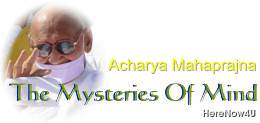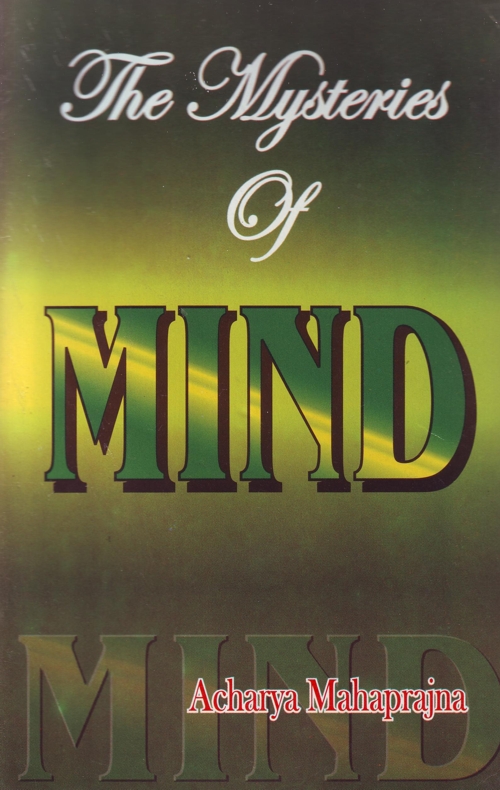
The modern man suffering from nervous tensions is not able to appreciate the spiritual view. But once he begins to practise meditation, his nervous tension begins to subside, glandular secretions become balanced and the mind becomes calm and he experiences joy. His delusions disappear and the encirclement by material objects ends. The whole trouble with the modern man is that, instead of taking full advantage of the spring of eternal joy within him, he runs after perishing pleasures which material objects offer.
Once an old woman was found searching for a needle. She had dropped it in her room, but she was searching for it on the road outside. A few children saw her and asked as to what she was searching for. The woman replied that she had dropped a needle in her room and as the room was utterly dark she thought it advisable to search for it on the road.
Acarya Bhiksu told a story to illustrate the same thing.
A man suffering from visual disorder went to a physician. The physician gave him an ointment, which he was advised to apply to his eyes. The patient returned home and applied the ointment to his back. When asked why he did so, he replied "I am doing so because when I applied it to the eyes I began to feel a burning sensation. "He felt no such sensation when he applied the ointment on his back.
I would like to tell you another story.
Once a camel and an ox happened to be together. The camel was suffering from some dis ease and he was to be stamped with a red hot rod of iron. A veterinary surgeon came and instead of stamping the camel he stamped the ox. When asked as to why he had stamped the ox, he replied that he had done so because his hand could not reach that part of the camel's body, which was to be stamped.
We too behave in the same way. You can very well imagine what are going to be the consequences of our foolishness.
It is difficult to imagine how many mutually contradictory actions we do in our life. We laugh at others when they do such things but we unconsciously do the same things ourselves. For example the spring of joy lies within us but we search for it outside ourselves. We behave like the old woman referred to above. Sadhana puts and end to such foolish conduct. It calls upon us to seek happiness within ourselves. It does not dissuade us from us ing material things so far as they are necessary.
Man needs two kinds of things. He needs things, which fulfil his material needs. He also needs things, which are capable of giv ing him joy and happiness. Spiritual exertion does not satisfy our material needs. Happiness and joy, on the other hand, can be achieved by spiritual exertion only. And yet we entertain delusions. We confuse spiritual satisfaction with material satisfaction. If material objects were capable of giving us happiness, the modern man could have been the happiest creature in the world. Our productive potential has raised sky high and yet we are unhappy. Science and technology have made us unhappier. The more the material wealth we command, the unhappier do we be come. It is the wealthy people who become insane, lose their sleep and commit suicide. It is they who have to take tranquillisers to get a sound sleep. Unlimited production and consumption of material commodities is the root cause of our mental imbalance. We have to do some serious thinking on this subject. Industrially ad vanced countries tell us that they are capable of relieving us of all kinds of miseries. But even these countries have lost the sense of direction. They have gone astray and are groping in the dark. They themselves badly need mental balance and peace of mind.
Of course, we have to satisfy the needs of the body and to support our families. The desire to satisfy these needs is a natural desire. We do not deny this fact. As a matter of fact we have never done so. But, at the same time, we have never accepted sadhana as a pastime or recreation. Sadhana has a purpose. It gives us encour agement; it makes our vision clear and provides us with permanent values of life.
The practitioner of sadhana is always active He labours to provide himself with the means of life. At the same time he is aware of the fact that he has to avoid miseries, which accompany his activities. He wants to shield himself against the reactions to his actions. He dissolves his delusions and attempts to obtain right vision. He is clear about what leads to misery and what gives hap piness. That is why he is capable of maintaining his mental equilibrium. Emotional imbalance is the special characteristic of the modern man. He is awfully perturbed. His experiences are continuously punctuated by sweetness as well as bitterness. Some times he commands self-confidence and at other times he loses it. This is the result of mental imbalance.
Mental balance implies freedom from attachments and aver sions; it also implies a sense of equality.Preksa meditation brings about a sense of equality. In it the practitioner feels pleasurable as well as painful sensibilities. But he tries to strike a balance between them. He tries to maintain and strengthen his equanimity. He aspires to be a pure spectator and to command pure knowledge.
The practice of self-exertion does not disturb the ordinary give-and-take of life. What is done is to wash off the dirt, which has become accumulated in our hearts. One who has achieved some advancement in sadhana will never deceive anybody. He will never harbour the feeling of enmity towards anybody. Besides intellectual convictions, he has experienced a higher state of mind. He values spiritual experiences more than anything else. He aims at reconstituting his personality.
 Acharya Mahaprajna
Acharya Mahaprajna

